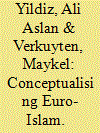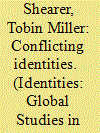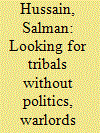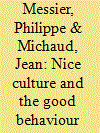|
|
|
Sort Order |
|
|
|
Items / Page
|
|
|
|
|
|
|
| Srl | Item |
| 1 |
ID:
114640


|
|
|
|
|
| Publication |
2012.
|
| Summary/Abstract |
Political, public and academic debates about the need for a 'Euro-Islam' as a necessary condition for the full integration of Muslim are widespread and strong. For Muslims and Muslim organisations in particular, Euro-Islam can be understood as subverting the very nature of their religious identity, making change or reform impossible. This raises the question as to how Muslim organisations reject the idea of the need for a Euro-Islam by construing the core of their faith as not being contradictory with Western values, norms and beliefs. The current study examines this question amongst two major Turkish Muslim organisations (Milli Görüs and Fethullah Gülen) in the Netherlands and Germany. The analysis shows that in managing the demand for reform a distinction was made between Islam as a belief system and Muslims as a group of people, between religion and culture as two types of belief systems and between politics and the true nature of the West.
|
|
|
|
|
|
|
|
|
|
|
|
|
|
|
|
| 2 |
ID:
114635


|
|
|
|
|
| Publication |
2012.
|
| Summary/Abstract |
In this essay, I argue that rather than correlating white identity and whiteness studies first with invisibility, power and privilege, white identity is more accurately correlated with overt conflict and crisis. Moreover, the study of white racial formation in one US-based but internationally focused religious organization between 1960 and 1985 also suggests that white identity is a conflict that results in power and privilege but that the power and privilege do not define the identity itself.
|
|
|
|
|
|
|
|
|
|
|
|
|
|
|
|
| 3 |
ID:
114634


|
|
|
|
|
| Publication |
2012.
|
| Summary/Abstract |
The post-September 11 narrative of the drug economy attempts to isolate this 'problem' to the space of Afghanistan locally by stressing the tropes of tribalism and warlordism. In this narrative, these two phenomena are framed as obstacles in building a strong state and its institutions and ensuring development in Afghanistan. In contrast, I propose to understand tribalism and warlordism as political and historical categories, both in the sense of their discursive use as well as their function in Afghan social and political life, as Afghans organized themselves, but were also organized by others - though not in isolation, but in continuous engagement with these others. I place this analysis within the broader discussion of understanding how the Cold War interventions affected the organizing of political power in Afghanistan.
|
|
|
|
|
|
|
|
|
|
|
|
|
|
|
|
| 4 |
ID:
114637


|
|
|
|
|
| Publication |
2012.
|
| Summary/Abstract |
The use of the mobile phone to contact research subjects granted me privileged access to a body of poetic and humorous texts. This article examines Cape Verdeans' use of pass-forward text messages to express allegiances to different collective identities that provide information and inspiration for Cape Verdeans living in Portugal. They are used to foment and express solidarity between Cape Verdeans, Africans, Christians and Women. An analysis of their contents elucidates two aspects of belonging. Firstly, the personal and intimate which tends to the Self, in its yearnings for a better future and for intimate relationship, sought through religious communion and romance. Secondly, the political and discursive which foments community, imagined not only through nation, Pan-Africanism and gender, but also beyond any such boundaries towards an all-inclusive dimension of belonging, rooted in relations of solidarity.
|
|
|
|
|
|
|
|
|
|
|
|
|
|
|
|
| 5 |
ID:
114639


|
|
|
|
|
| Publication |
2012.
|
| Summary/Abstract |
In the northern highlands of Vietnam, a very specific official vision of culture is at the core of the modernisation projects of Vietnam Television VTV5 (Ðài Truy?n hình Vi?t Nam), a channel dedicated to educating ethnic minorities, and of the Lào Cai provincial branch of the Ministry of Culture, Sports and Tourism (MCST, B? Van hóa, Th? thao và Du l?ch). These two state institutions jointly organise film screenings - for instance condemning the production and consumption of opium and heroin - in remote villages where they intend to modify cultural practices. These state social actors also produce films that represent what are deemed exemplary minority traditions for public consumption. Our observations of these media processes lead us to suggest that the subjects of these exogenous initiatives are adjusting strategically, activating patterns of quiet resistance to maintain their identities and subvert marginalisation.
|
|
|
|
|
|
|
|
|
|
|
|
|
|
|
|
| 6 |
ID:
114638


|
|
|
|
|
| Publication |
2012.
|
| Summary/Abstract |
This article investigates how women who have come to the United States as brides of South Asian professionals use threading, a hair removal method, as a home business to negotiate new challenges they face as newly immigrant women. Based on participant observation and in-depth interviews, the article focuses on how these young women combine their expected roles as wives and mothers in a new country with their own aspirations to win the respect of spouses, in-laws and children via threading. The article demonstrates how these women find meaning and identity through threading and evidences how they negotiate respectability by stressing their connections to home and domestic roles even as they dissociate themselves from beauticians who work at salons. Although they disrupt extant notions of 'good wives and mothers', these women nevertheless articulate this disruption within existing models and, more often than not, desire to be the bahu that their mothers-in-law admire.
|
|
|
|
|
|
|
|
|
|
|
|
|
|
|
|
| 7 |
ID:
114636


|
|
|
|
|
| Publication |
2012.
|
| Summary/Abstract |
This article reviews the creation of Somali Bantu ethnicity as an object of humanitarian intervention during Somalia's civil war. A variety of local, regional and international actors combined to create the ethnonym Somali Bantu for a group of refugees identified as a persecuted minority by the UNHCR and the US government and selected for resettlement in the United States. I track the emergence of the name and its affective dimensions for those who embrace Somali Bantu identity and assess criticisms of its authenticity and legitimacy. The creation of Somali Bantu identity reveals critical dimensions of how race is translated across time and space. Since a fundamental dimension of Somali Bantu identity is based on presumptions of racial difference, the article traces the salience of constructed difference for social hierarchies within Somalia, colonial projects in Somalia, refugee camp life in Kenya, US resettlement policy and diaspora politics in the United States.
|
|
|
|
|
|
|
|
|
|
|
|
|
|
|
|
|
|
|
|
|